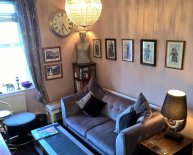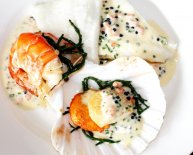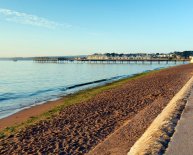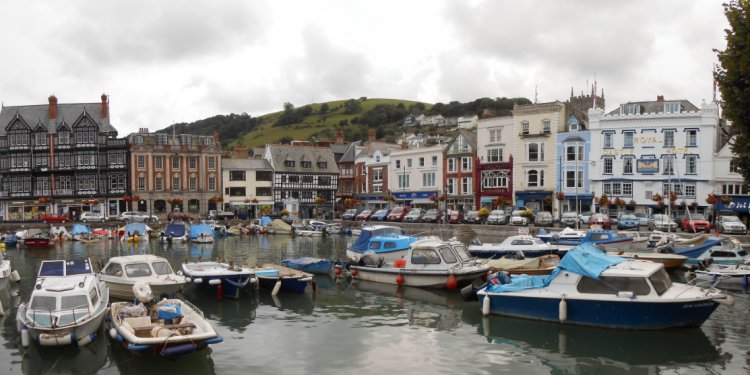
Hotels Dartmouth Devon England
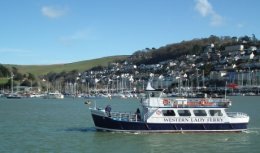 Situated on the River Dart in Devon’s South Hams, Dartmouth is a thriving town, with its narrow streets, overhanging medieval houses and old quays a haven for yachtsmen and visiting tourists alike, offering fine restaurants, galleries, marinas, antique shops and fine places to stay.
Situated on the River Dart in Devon’s South Hams, Dartmouth is a thriving town, with its narrow streets, overhanging medieval houses and old quays a haven for yachtsmen and visiting tourists alike, offering fine restaurants, galleries, marinas, antique shops and fine places to stay.
Although there was originally a nearby hilltop village and church at Townstal, Dartmouth’s origins derive from soon after the Norman conquest, when the French realised the value of the safe harbour for cross-channel voyages to their territories in Normandy. The rapid development was such that by the 12th century the town was used as an assembly point for a fleet of 146 ships setting out on the Second Crusade in 1147, and again in 1190, when more than 100 vessels embarked upon the Third Crusade. These events have given the name to Warfleet Creek, which lies just inside the river mouth.
Later a dam was built (modern Foss Street) across the tidal creek to power two grain mills, thereby joining together the two villages of Hardness and Clifton which now form the modern town. By the 14th century Dartmouth had grown considerably and the Dartmouth merchants were growing rich on the wine trade with English-owned lands in Gascony. In 1341, the king rewarded the town a charter of incorporation, and in 1372 St. Saviour's Church was consecrated and became the town church.
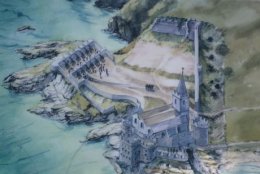 In 1373 Chaucer visited the area, and later wrote of a "Shipman of Dartmouth, " one of the pilgrims in the Canterbury Tales. The Shipman was a skilled sailor but also a pirate, and it is said that Chaucer based the character on the colourful John Hawley (d.1408) – the leading merchant and fourteen times Mayor of Dartmouth, who was also a privateer in the Hundred Years War.
In 1373 Chaucer visited the area, and later wrote of a "Shipman of Dartmouth, " one of the pilgrims in the Canterbury Tales. The Shipman was a skilled sailor but also a pirate, and it is said that Chaucer based the character on the colourful John Hawley (d.1408) – the leading merchant and fourteen times Mayor of Dartmouth, who was also a privateer in the Hundred Years War.
Dartmouth Castle circa 1760, artist's impression
This was completed around 1400, and was provided with a moveable chain connected to another fort on the Kingswear side of the river to prevent river-borne attacks on the town. The castle was one of the first in the country to have provision for gunpowder artillery, and has been altered and adapted many times as weapons technology has progressed.
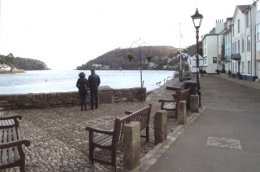 When a 2000-strong Breton force landed at Slapton in 1404 in an attempt to capture nearby Dartmouth and avenge English privateer’s actions in France, Hawley quickly organised an army of untrained locals and defeated the well-armed knights at the Battle of Blackpool Sands, the knights being weighed down by their armour and unsupported by their archers. Hawley's brass lies in St. Saviour's church in the chancel which he built, and after his death his house was used as the Guildhall for almost 400 years.
When a 2000-strong Breton force landed at Slapton in 1404 in an attempt to capture nearby Dartmouth and avenge English privateer’s actions in France, Hawley quickly organised an army of untrained locals and defeated the well-armed knights at the Battle of Blackpool Sands, the knights being weighed down by their armour and unsupported by their archers. Hawley's brass lies in St. Saviour's church in the chancel which he built, and after his death his house was used as the Guildhall for almost 400 years.
When under threat from the Spanish Armada in 1588, Dartmouth sent 11 ships to join the English fleet and captured the Spanish flagship, the Nestra Señora del Rosario, which was anchored in the Dart for over a year while its crew worked as slaves at Greenway House. Greenway was the home of Sir Humphrey Gilbert and his half-brother, Sir Walter Raleigh. Both were great explorers and adventurers, and although Gilbert failed in his quest to find the North West Passage, in 1583 he claimed Newfoundland for England.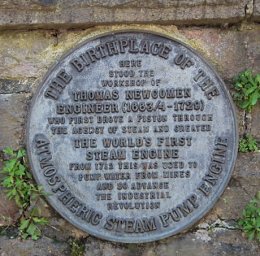 Today, Greenway is also well known for another of its owners – the Devon born author, Agatha Christie.
Today, Greenway is also well known for another of its owners – the Devon born author, Agatha Christie.
The rich fishing from the cod banks in this area gave the town a further period of prosperity. The surviving 17th century Butterwalk Quay and many 18th century houses around the town today are the most obvious results of this prosperous trade. In 1620 the Pilgrim Fathers, bound for America, berthed the Mayflower and Speedwell ships at Bayard’s Cove for repairs. Contact with these new colonies expanded, and by the 18th century locally-made goods were traded with Newfoundland, while the salted cod was sold to Spain and Portugal in exchange for wine.
During the English Civil War Dartmouth was also involved, and the castle played a significant part. Royalists besieged and captured the castle and held it for three years. However, when the Parliamentarians under Sir Thomas Fairfax attacked and took the town, the Royalists surrendered the castle the next day.

